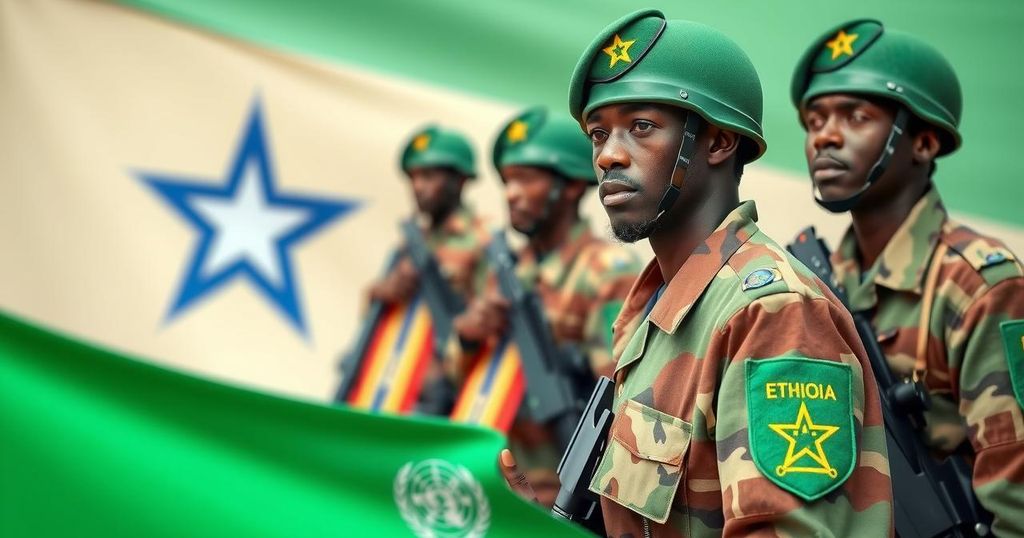Ethiopia Supports New African Union Peacekeeping Mission in Somalia

Ethiopia has pledged support for a new African Union peacekeeping force to counter Al-Shabaab insurgents in Somalia. Following a period of strained relations, the defense ministers of both countries have met and reaffirmed commitment to cooperation in ensuring regional stability. The peacekeeping initiative seeks to replace the existing mission in Somalia, reflecting a collaborative effort bolstered by international support.
On Friday, Ethiopia declared its support for a newly established African Union (AU) peacekeeping force designated to combat the Islamist insurgent group Al-Shabaab in Somalia, which is scheduled to deploy later this month. Initially, there were indications that Ethiopian troops would not be involved due to a prior agreement concerning maritime issues with the self-declared independent region of Somaliland. However, following successful negotiations last month, facilitated by Turkey, both nations reached a settlement aimed at alleviating existing tensions.
Ethiopian Defence Minister Aisha Mohammed visited Somalia on Thursday, where she engaged with President Hassan Sheikh Mohamud and conveyed a message from Prime Minister Abiy Ahmed. The discussions underscored the commitment of both countries to promote peace and stability in Somalia and the surrounding region, as stated by the Ethiopian foreign ministry. Improvements in relations include a joint initiative to support the AU Support and Stabilization Mission in Somalia (AUSSOM).
The UN Security Council had previously authorized the creation of this mission, with a resolution supported by fourteen of the fifteen council members, the United States being the sole abstention reflecting fiscal concerns. AUSSOM is intended to replace the UN-backed African Union Transition Mission in Somalia (ATMIS), which had a projected troop level of around 12,000 until its withdrawal at the end of December.
During the UNSC discussions, representatives from Somalia and Ethiopia engaged without voting rights, with Somalia’s delegation providing insights on the bilateral agreements made in November. These agreements plan for the deployment of approximately 11,000 troops sourced from allied nations for the AUSSOM initiative. Furthermore, the context allows for the potential application of a mechanism set up by the council for an AU force backed by the UN, with financial backing covering up to 75 percent sourced from the organization.
In an effort to maintain a tenuous peace, Somalia’s Foreign Minister Ali Mohamed Omar met with Ethiopian Foreign Minister Mesganu Arega last week, following violent incidents near the Doolow border. The meeting aimed to reinforce diplomatic relations and strategic collaboration between the neighboring nations.
The current collaboration between Ethiopia and Somalia highlights ongoing efforts to stabilize the region amid persistent threats from insurgent groups.
The backdrop of this development is rooted in the longstanding regional challenges posed by Al-Shabaab, an extremist group that has operated in Somalia for several years, exacerbating insecurity and humanitarian crises. The UN Security Council’s involvement signifies international recognition of the need for a stabilized Somalia through multilateral support. Moreover, the historical context of Ethiopia and Somalia’s complex relationship, often influenced by border disputes and differing political alignments, adds layers to the current developments. The recent Turkish mediation reflects a growing trend of third-party involvement in resolving regional conflicts within the Horn of Africa.
In summary, Ethiopia’s endorsement of the new AU peacekeeping force in Somalia represents a significant shift in bilateral relations following a period of tension. The commitment to collaborate on peacekeeping efforts signifies a mutual desire for stability in Somalia and highlights regional dynamics involving international stakeholders. The ongoing dialogue and agreements formalized between the two nations underscore a commitment to overcoming past grievances and fostering cooperative security measures.
Original Source: www.barrons.com








